
50th Anniversary Commemorative Report


50th Anniversary Commemorative Report

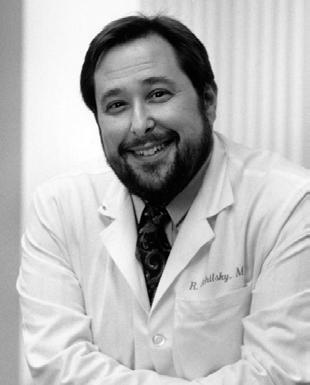
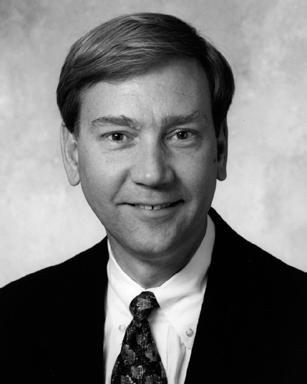



Kunle Odunsi, MD, PhD
Director, University of Chicago Medicine
Comprehensive Cancer Center
Dean for Oncology, Biological Sciences Division
The AbbVie Foundation Distinguished Service
Professor of Obstetrics and Gynecology
The University of Chicago’s contributions to cancer research can be traced to the 1920s; however, its existence as a formal center of excellence in cancer research was established in 1973, when it became a National Cancer Institute-designated cancer center.
More than five decades later, the University of Chicago continues to be a national leader in research to develop new ways to treat, prevent and diagnose cancer.
In honor of the 50-year milestone of the UCCCC’s NCI designation, this commemorative report features 50 exciting developments that occurred over this time period. Looking back at the progress we’ve made on many fronts in cancer research invites the opportunity to imagine how the advances of today will bring endless possibilities for the future.
The University of Chicago Medicine Comprehensive Cancer Center (UCCCC) first received NCI designation in 1973, the same year in which it was founded by John Ultmann. It was one of the original 15 cancer centers congressionally mandated in the National Cancer Act. NCI designation is bestowed upon the nation’s top cancer centers in recognition of their innovative research and leading-edge treatments. “Comprehensive” status — NCI’s highest federal ranking — has been held since 2008.
The health system has expanded beyond the Hyde Park campus to enhance services for cancer patients:
• 1996: The Duchossois Center for Advanced Medicine opened in Hyde Park.
• 2005: Comer Children’s Hospital opened, home to pediatric cancer experts.
• 2012: The UChicago Medicine Comprehensive Cancer Center opened at Silver Cross Hospital in New Lenox.
• 2013: The Center for Care and Discovery opened in Hyde Park, featuring a dedicated cancer floor.
• 2016: UChicago Medicine merged with Ingalls Health System and opened an outpatient facility in Orland Park.
• 2018: Comer partnered with area providers to form the Chicagoland Children’s Health Alliance.
• 2020: Cancer facilities opened at River East.
• 2022: Cancer facilities opened at AMITA Saint Joseph Hospital Chicago.
• 2023: A joint venture with AdventHealth expanded services in Chicago’s western suburbs.
• 2024: A specialty care center opened in Crown Point, Indiana.
The UCCCC has a long history of pioneering new imaging techniques to improve cancer diagnosis. In 1973, Charles Metz with Kurt Rossman pioneered radiology image analysis methods now used worldwide for evaluating diagnostic performance. In 1998, Abraham Dachman helped develop CT colonography, a noninvasive alternative to colonoscopy. Maryellen Giger founded the UCCCC’s Advanced Imaging Program in 1994, a time when most cancer centers did not have a dedicated imaging program. This program saw advancements in computer-aided diagnosis in breast imaging and innovative MRI-guided treatments for breast and prostate cancer.
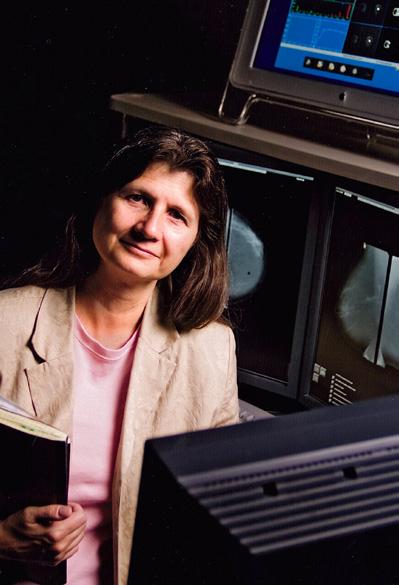
Since 1978, the Simon M. Shubitz Cancer Prize and Lectureship has brought internationally respected cancer researchers to the UCCCC. The award is named in honor of Shubitz, a distinguished physician and humanitarian. Past winners include Peter Nowell, co-discoverer of the Philadelphia Chromosome; Judah Folkman, a pioneer in angiogenesis; Harold Varmus, a Nobel Prize winner who discovered retroviral oncogenes; and Mary-Claire King, a geneticist who linked the BRCA genes to breast cancer.
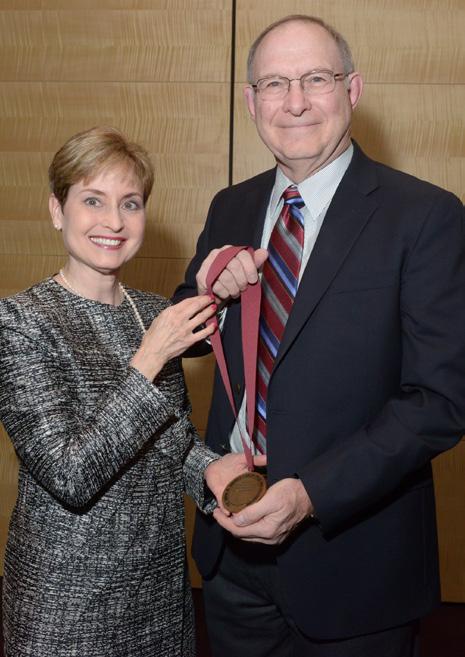
Although UCCCC cancer experts have been setting the standards of care for decades, our center was formally recognized in 2023 with membership to the National Comprehensive Cancer Network (NCCN). NCCN’s 33 member institutions work together to define and advance high-quality, high-value, patient-centered cancer care globally. They maintain the NCCN Clinical Practice Guidelines in Oncology, which reflect the very latest data and best practices.
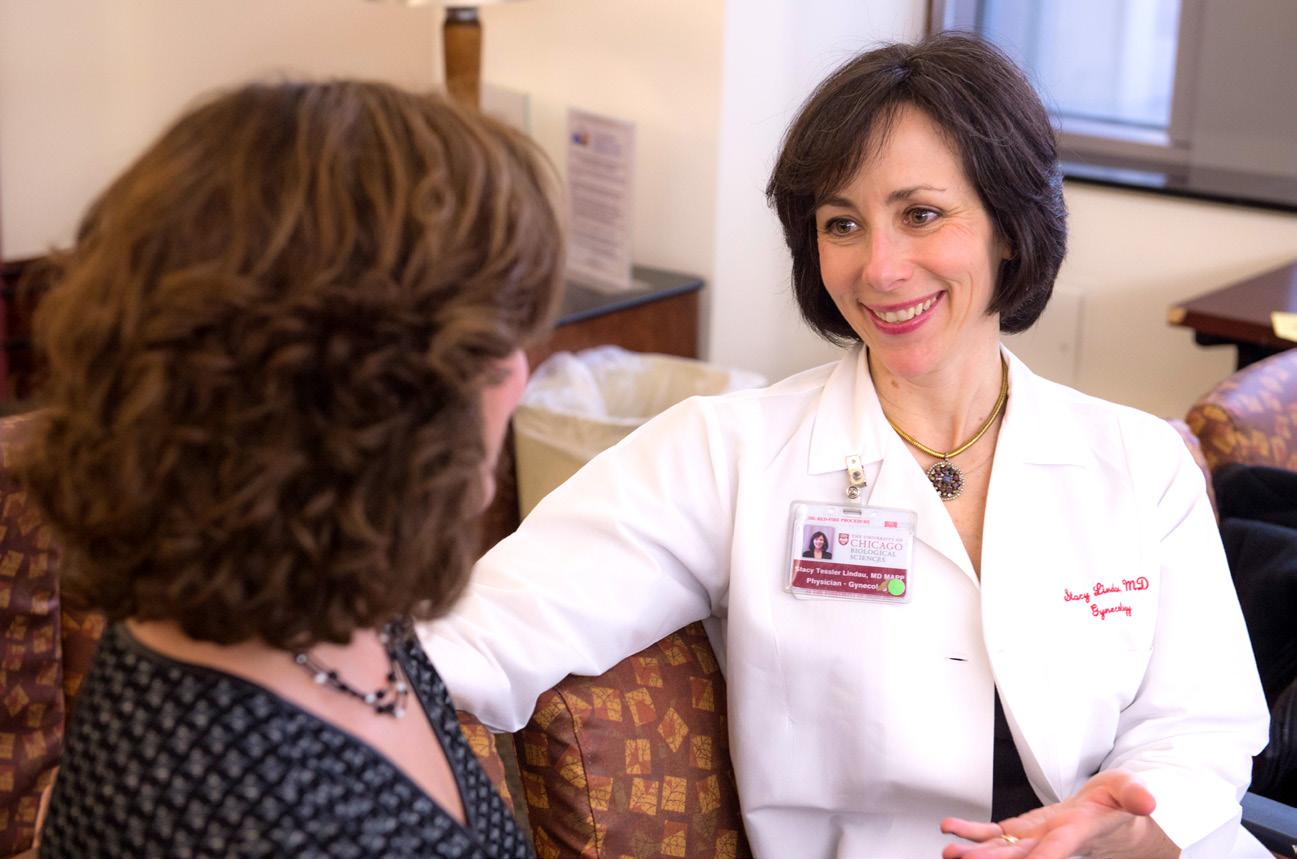
The UCCCC has a rich history of excellence in gynecologic cancer research and treatment. In 1971, Arthur Herbst published pivotal research linking diethylstilbestrol, a drug once used to prevent miscarriage, to a rare cancer in offspring. Robert Stepto, who joined the faculty in 1979, introduced innovative surgical techniques, including gynecologic laser surgery, and advocated for the use of Pap smears to detect cervical cancer. Recent research has focused on ovarian and high-risk endometrial cancers. The UCCCC also offers patient support programs, including initiatives addressing sexual health led by Stacy Lindau and Diane Yamada, and a peer mentorship program for gynecologic cancer survivors.
In recent decades, UCCCC researchers have expanded their impact by translating innovative ideas into the marketplace through start-ups and business partnerships. The Polsky Center for Entrepreneurship and Innovation at UChicago supports these efforts by managing intellectual property, fostering collaborations and negotiating technology licenses for faculty and researchers. Additionally, many faculty members have successfully licensed their intellectual property without launching their own companies. Biotech and pharmaceutical firms are eager to partner with UCCCC to develop new services and products based on leading-edge research. Notably, in 2016, the University established a five-year collaboration with AbbVie to accelerate oncology research. Looking ahead, a new state-of-the-art advanced sciences building at Hyde Park Labs, set to open in 2025, will further enhance opportunities for translating early-stage concepts into commercial ventures.

Immunotherapy, an approach that harnesses a patient’s immune system to fight against cancer cells and eliminate them from the patient’s body, has revolutionized how we treat many cancers, especially those that are hard to treat. Seminal discoveries by Frank Fitch on CD8+ T cells, Craig Thompson on lymphocyte survival mechanisms, and Jeffrey Bluestone on CTLA-4 inhibition led to therapies like ipilimumab.
Thomas Gajewski and Justin Kline’s recent work demonstrated ways to enhance T-cell infiltration into the tumor microenvironment.
Thomas Gajewski with a patient.
With generous philanthropic support from donors, our researchers have had the flexibility to pursue some of their most innovative ideas. These gifts help us seed new research ideas, support clinical trials, unlock molecular mysteries, acquire new technologies and design better therapies. Donors continue to play an important role in the future of cancer research.
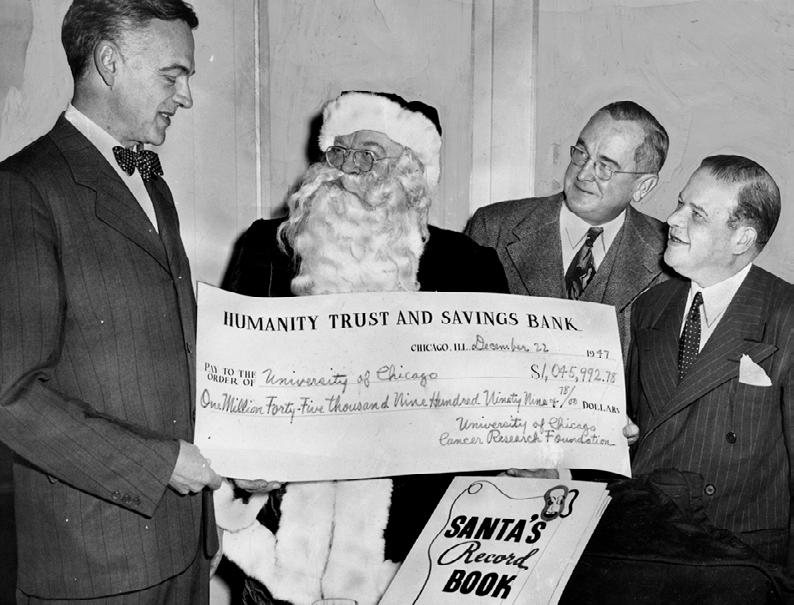
UCCCC researchers have significantly advanced breast cancer detection, diagnosis, treatment and prevention over the decades. Notable achievements include Geoffrey Greene and Elwood Jensen’s development of monoclonal antibodies for estrogen receptors, and Maryellen Giger’s creation of the first FDAapproved computer-aided diagnostic tool in 2008. Olufunmilayo Olopade’s work highlighted genetic disparities in triple-negative breast cancer among women of African ancestry, while Rita Nanda’s studies established immunotherapy’s role in treating this subtype. Additionally, innovations like microsurgical procedures for lymphedema and the Bionic Breast Project aim to enhance patient care and quality of life.
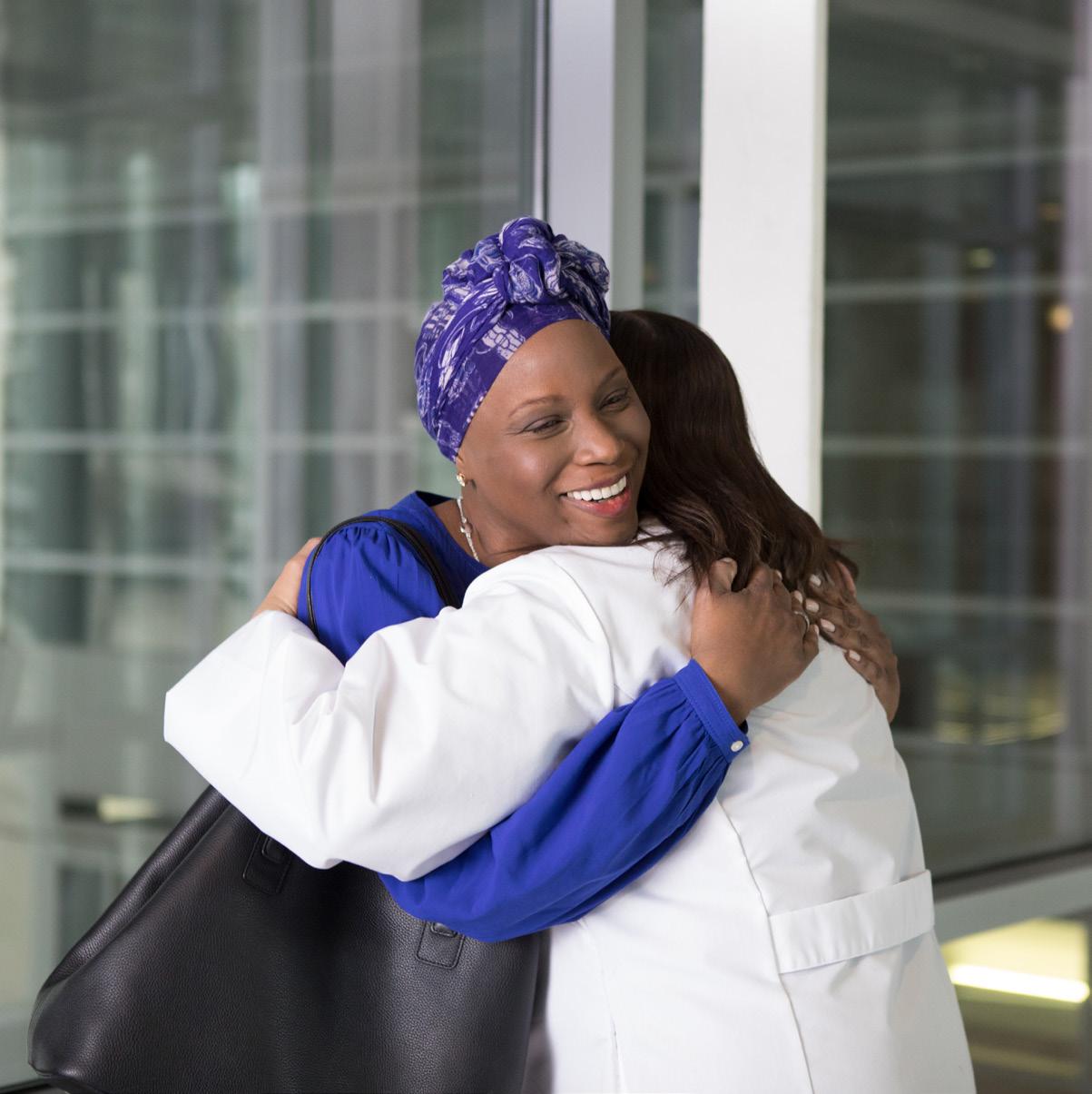
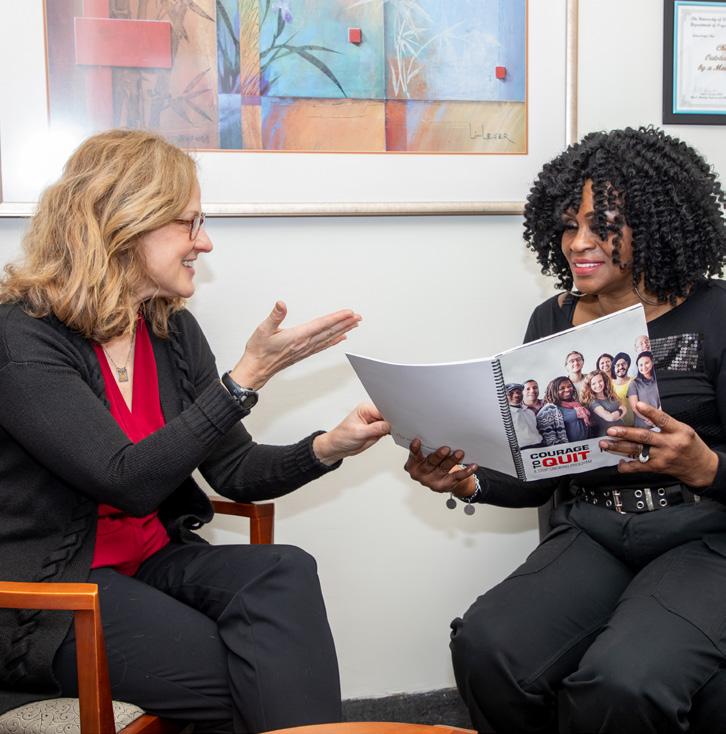
Patients who quit smoking after a cancer diagnosis recover faster, experience fewer side effects and lower their risk of a second cancer. However, making this lifestyle change can be challenging. Andrea King develops innovative, evidence-based tobacco cessation programs, including individual counseling and nicotine replacement therapy, positioning the UCCCC as one of 22 NCI-selected cancer centers to implement sustainable tobacco treatment initiatives. Additionally, King and her team are investigating how lifestyle factors, such as alcohol consumption, affect nicotine addiction. Recognizing that adults with low socioeconomic status smoke at higher rates, Marcia Tan is training community health workers to deliver tailored cessation interventions.
Surgeons at UCCCC are nationally recognized for improving outcomes in various cancers, many deemed untreatable by other institutions. They utilize advanced surgical techniques to deliver chemotherapy directly into the abdomen, shrinking tumors and reducing side effects compared to traditional methods. UChicago Medicine is among the few hospitals in the U.S. to offer radical vaginal trachelectomy, a fertility-preserving option. Our surgeons performed the first Whipple procedure for pancreatic cancer in 1937 and now incorporate robot-assisted techniques. The University of Chicago Medical Center was ranked “high performing” in colon, lung, ovarian, uterine and prostate cancer surgery in the latest USNWR rankings.

The most effective way to combat cancer is to prevent its development or catch it in its earliest stages. Our specialists are pioneering new prevention and early detection strategies informed by leadingedge research and focusing on high-risk individuals. Established in 1992 by Olufunmilayo Olopade, the Comprehensive Cancer Risk and Prevention Clinic was the first in Illinois to offer preventive services for those at increased risk due to family history or genetic factors. Under the leadership of Olopade and Sonia Kupfer, the clinic has expanded significantly since the 1990s and now monitors thousands of patients for early signs of cancers, including breast, gynecologic, gastrointestinal, prostate and blood cancers.
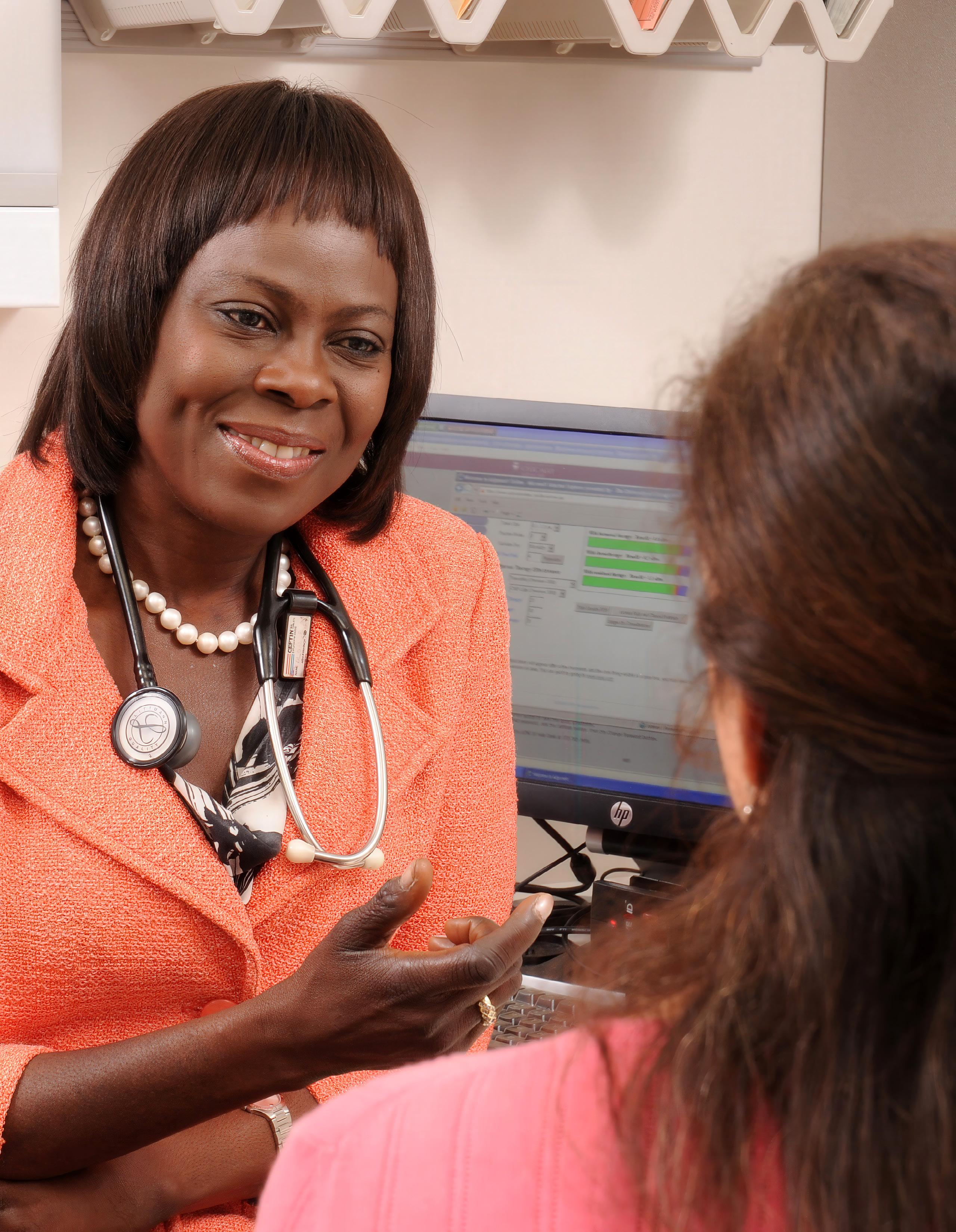
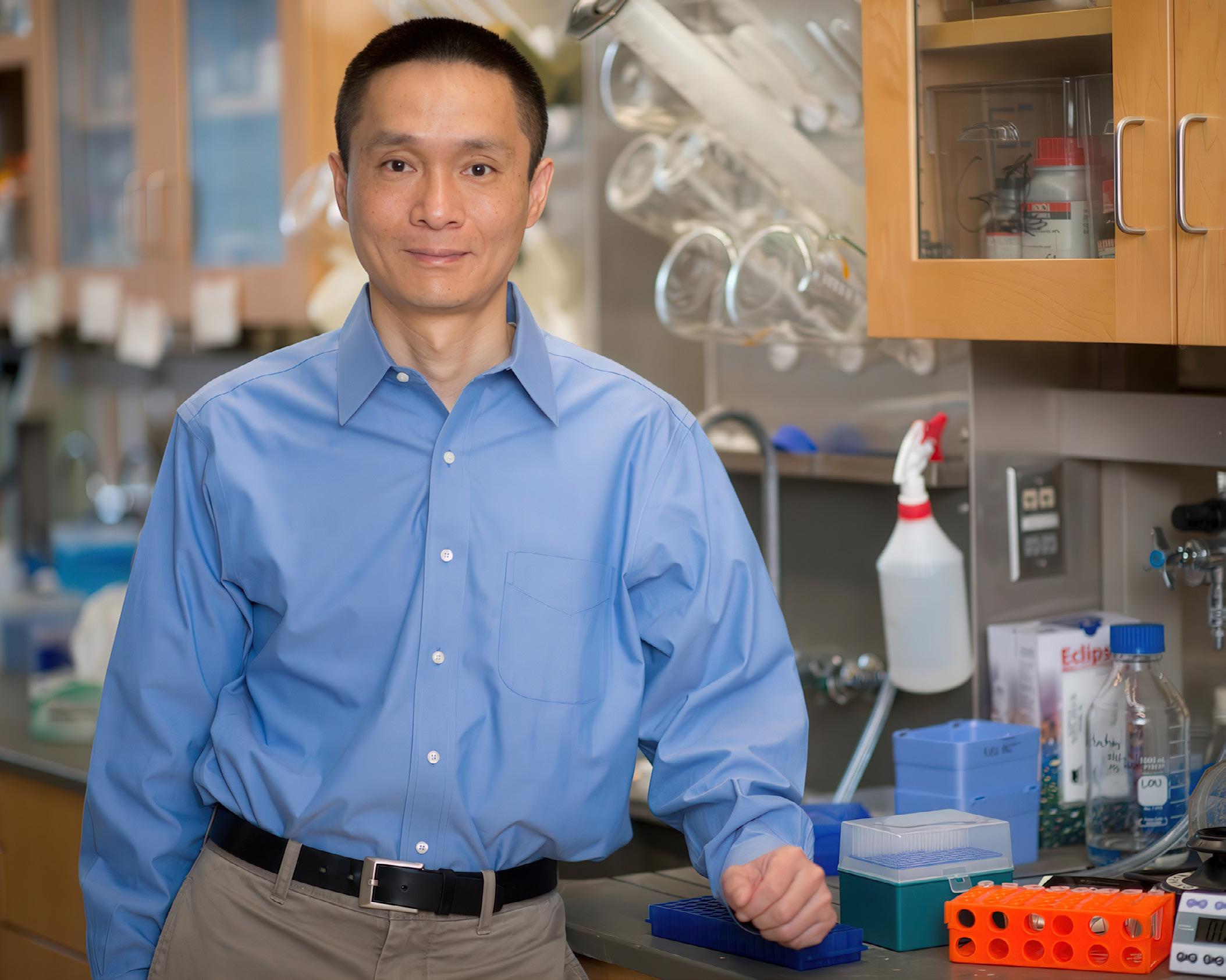
Epigenetics — the study of how cells change genes without altering the DNA sequence itself — may reveal important clues about cancer initiation, progression and metastasis. Our researchers are developing technologies and chemistry methods to detect different epigenetic marks to understand how they impact gene and cellular function. In 2011, Chuan He opened a new avenue of research with his discovery of a particular process called reversible RNA methylation, which plays a critical role in how genes are regulated at the transcriptional and post-transcriptional levels. Prior to He’s work, RNA modifications were known to fine-tune the structure and function of RNA. He’s work demonstrated that RNA modifications could be reversed and may have broad gene regulation analogous to DNA modifications. In addition to winning multiple prestigious international awards for this discovery, He helped to launch “epitranscriptomics,” an exciting new field in biology that studies the collective set of modified, or tagged, RNA.
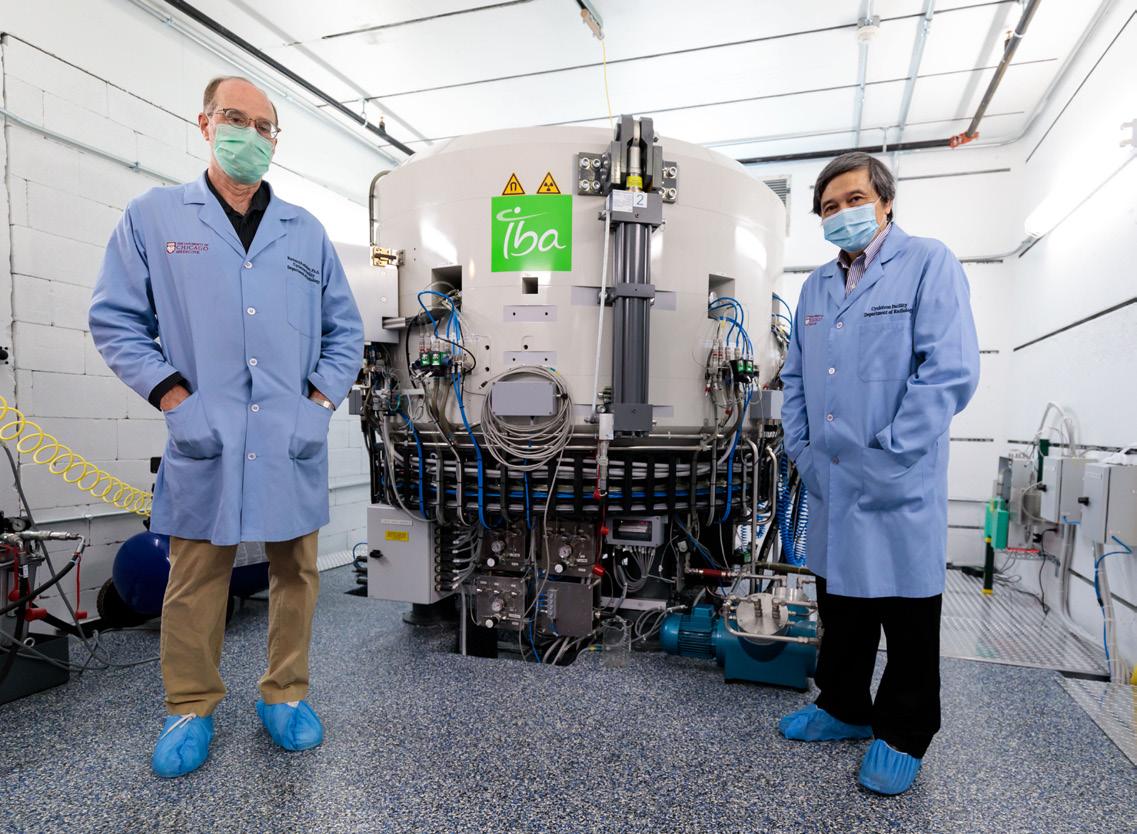

The UCCCC has a long-standing record of developing and supporting the training and career development of cancer researchers and clinicians by providing robust educational and professional development opportunities for learners at all levels. In 2014, Eileen Dolan initiated summer cancer research training programs for high school and undergraduate students to introduce young people to the field of cancer research. Since then, the programs have served over 700 young people, the majority from underrepresented populations. By providing hands-on experience in the labs of world-renowned cancer researchers, the programs have inspired many participants to pursue careers related to cancer research or care.
The UCCCC is a pioneer in modern nuclear medicine, crucial in developing radioactive isotopes for cancer diagnosis and treatment. The installation of a cyclotron in 2017, the only one in an academic health system in Illinois, enabled the production of novel radiopharmaceuticals and ushered in a new era of research. UCCCC scientists are focused on advancing innovative cancer treatments, including cancer theranostics, which utilize radioactive isotopes for both diagnosis and therapy.
Until the 1970s, few scientists believed chromosomal aberrations caused cancer, but Janet Rowley’s discovery of specific chromosomal rearrangements in leukemia transformed this understanding, establishing cancer as a genetic disease. Her findings paved the way for targeted drug development and a lasting research model. Rowley and her colleagues positioned the UCCCC as a leader in cancer cytogenetics, essential for accurate diagnosis and treatment selection. Today, a team of board-certified pathologists and lab scientists are nationally recognized for their expertise in highthroughput sequencing and precision genomic diagnostics to identify cancer-causing variants and guide treatment.
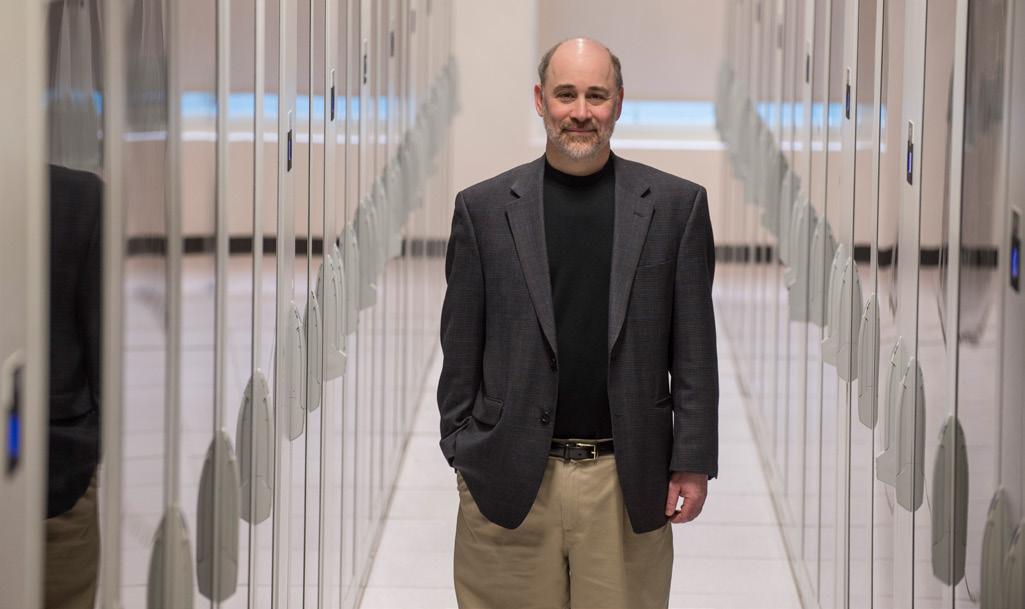
Mining large datasets is essential for understanding cancer development, but challenges in handling and analyzing genomic data hinder personalized medicine. The UCCCC has emerged as a national leader in addressing these issues, notably with Robert Grossman’s creation of the Bionimbus Protected Data Cloud in 2013, the first NIH-approved system for processing
Cancer Genome Atlas data. Following this, the team launched the International Neuroblastoma Risk Group Data Commons and the Genomic Data Commons, the largest collection of harmonized cancer genomics data. Additionally, the Pediatric Cancer Data Commons, recognized by the White House in 2024, and participation in Project GENIE and CancerX further enhance data accessibility and innovation in cancer research.
Cancer health disparities are pronounced in Chicago, prompting the UCCCC to focus on understanding their causes and developing evidence-based interventions for equity. In 2010, the UCCCC established the Office of Community Engagement and Cancer Health Equity (OCECHE) to support local communities through research, education and outreach, collaborating with community partners to address specific needs. In 2024, the UCCCC launched the Center to Eliminate Cancer Inequity (CinEQUITY) to implement solutions for reducing disparities in collaboration with communities and policymakers.


In 1975, Leslie DeGroot and Samuel Refetoff linked thyroid cancer to prior X-ray treatments, prompting a nationwide screening campaign. Edwin Kaplan significantly advanced the understanding of endocrine diseases, particularly the connections between radiation exposure and thyroid cancer. Over the past five decades, improvements in thyroid biomarkers have enhanced early detection, recurrence monitoring and treatment effectiveness for thyroid cancer. Recent studies, including those by Nishant Agrawal and Nicole Cipriani in 2024, have revealed distinct mutational profiles in aggressive anaplastic thyroid carcinoma, while researchers Brisa Aschebrook-Kilfoy and Raymon Grogan are exploring the comprehensive impacts of thyroid cancer through the North American Thyroid Cancer Survivorship Study.
Metastasis is a leading cause of cancer mortality, and the University of Chicago’s Ludwig Center for Metastasis Research has been at the forefront of addressing this issue since 2006. Co-directed by Ralph Weichselbaum and Geoffrey Greene, the center utilizes advanced technologies to study and target disseminated tumor cells, aiming to develop effective treatments for metastasis. Weichselbaum and Samuel Hellman proposed the oligometastatic hypothesis in 1995, suggesting that patients with limited metastasis could be cured through surgery or radiotherapy. Over the past 50 years, Greene has focused on preventing and treating breast cancer metastasis to reduce its impact on women.
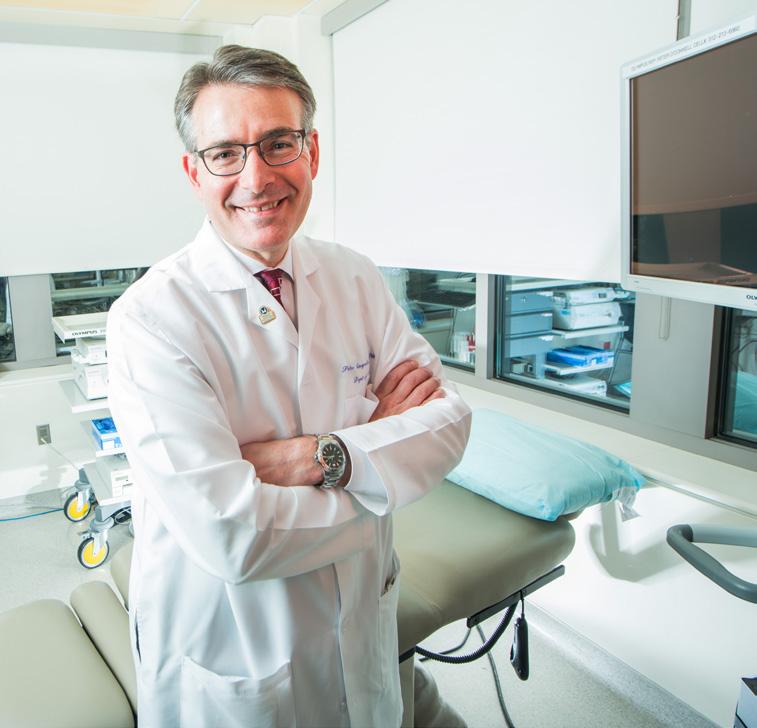
In 1966, Charles Huggins won the Nobel Prize for pioneering hormonal therapy for prostate cancer, laying the groundwork for modern treatments. The UCCCC builds on this legacy through clinical research to enhance patient outcomes and quality of life. Nicholas Vogelzang led national efforts that advanced androgen receptor-targeted therapies, while Walter Stadler initiated multicenter studies in the early 2000s. Today, under Russell Szmulewitz, the UCCCC explores novel hormone pathways and targeted therapies, while Akash Patnaik investigates strategies to boost immunotherapy effectiveness. The High-Risk and Advanced Prostate Cancer Clinic, established in 2019, offers genetic evaluations and noninvasive treatments like HIFU and PSMA PET imaging. Prominent figures like Scott Eggener advocate for careful surveillance, and imaging experts Aytekin Oto and Greg Karczmar are enhancing prostate cancer diagnosis through advanced MRI techniques.

Over the past 50 years, researchers have gained insights into the genetic and protein changes that drive cancer development and spread. The UCCCC focuses on identifying promising biomarkers and diagnostic tools to provide patients with tailored treatments, a key aspect of precision medicine. Cancer biomarkers aid in detecting cancers, selecting specific treatments and predicting patient responses. Additionally, liquid biopsies — noninvasive tests that analyze DNA and genetic information from blood or other body fluids — are emerging as a method to assess treatment responses and guide real-time adjustments to therapy.
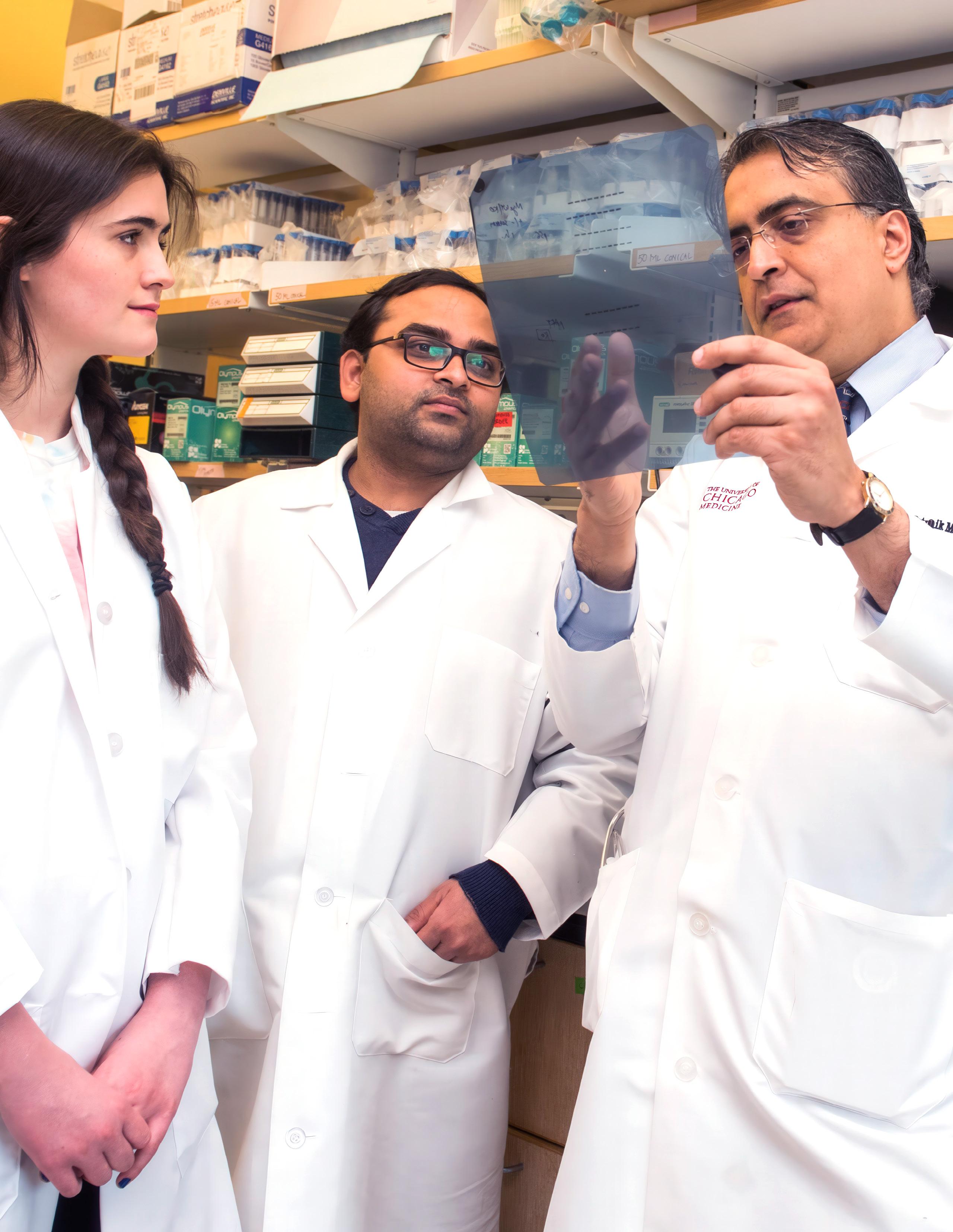

In 1972, Janet Rowley discovered that certain leukemias arise from abnormal chromosomal exchanges, establishing the genetic basis of cancer and paving the way for targeted therapies. Alongside colleagues Michelle Le Beau, Wendy Stock and Richard Larson, she later identified therapy-related acute myeloid leukemia (t-AML) and its genetic mechanisms, highlighting the role of tumor suppressor genes. Michael Thirman contributed to identifying mutations in the MLL (KMT2A) gene, leading to new targeted treatments. Harvey Golomb became an expert in interferon therapy for hairy cell leukemia, while James Vardiman codeveloped the WHO classification for leukemias and lymphomas in 2001. UCCCC researchers frequently lead clinical trials for new leukemia drugs, with Larson playing a key role in the approval of midostaurin for FLT3 -mutated AML. In 2022, Daniel Arber spearheaded the International Consensus Classification, refining diagnostic criteria for blood cancers.
Environmental carcinogens are a major cancer risk factor. In 1982, Ronald Harvey revealed how pollutants are converted into cancer-inducing metabolites. Researchers are now exploring the complex links between the environment and cancer, particularly in high-risk industries, such as asbestos exposure leading to mesothelioma. Hedy Kindler is leading clinical trials for mesothelioma treatments, while Habibul Ahsan’s 2006 study on arsenic prompted the U.S. to lower arsenic limits in drinking water. Brisa Aschebrook-Kilfoy is developing resources to assess how various exposures affect cancer risk, and in 2023, Yu-Ying He began investigating how environmental toxins can alter a cell’s epitranscriptome, increasing cancer vulnerability.
Nearly 70,000 teens and young adults are diagnosed with cancer each year, and nearly 80% survive more than five years. In 2012, Wendy Stock and colleagues filled a gap in cancer research and care by launching the Adolescent and Young Adult (AYA) Oncology Program for patients between 15 and 39 years old. Based on groundbreaking clinical research led by Stock, Richard Larson and James Nachman that highlighted disparities in outcomes for young adults with leukemia, the AYA Oncology Program addresses the unique challenges that this population faces during treatment. Tara Henderson and colleagues conducted a first-of-its-kind study which found that teen and young adult survivors are six times more likely than the general population to die from cardiovascular events, pulmonary disease or a subsequent cancer, even more than two decades after their initial diagnosis. The Childhood Cancer Survivors Center offers followup through adulthood to monitor the impact of the disease and treatment on the patient’s health.
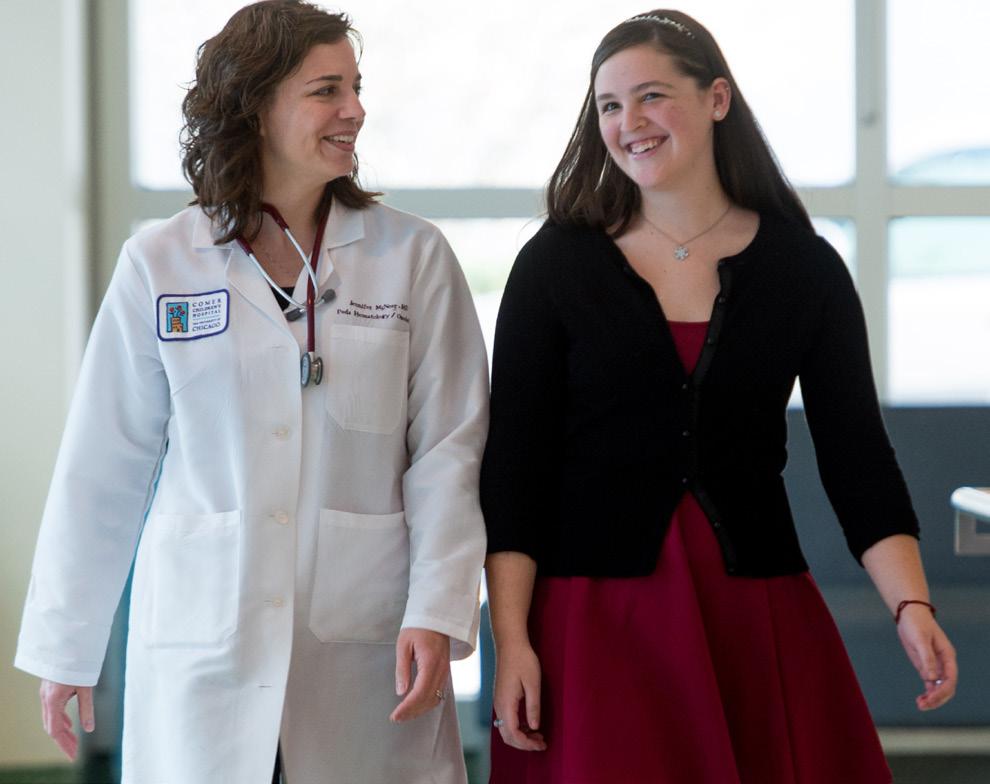

Ovarian cancer is often called the “silent killer” due to late-stage diagnoses with minimal symptoms. Understanding its molecular causes is crucial for developing new treatments. Ernst Lengyel’s team found in 2018 that some ovarian cancers originate in the fallopian tubes, while others metastasize from outside, challenging existing treatment paradigms. His 2012 research showed that fibroblasts in the cancer microenvironment mobilize glycogen to fuel metastasis. Oncologists Gini Fleming and John Moroney lead national trials to evaluate new treatments, while Iris Romero’s clinic offers personalized risk assessments for women with genetic predispositions. In 2021, Kunle Odunsi and colleagues received a prestigious SPORE grant to discover better treatment options for the disease.
Big Data and computational tools are greatly accelerating the power and pace of cancer research. Mining large datasets and analyzing multiple types of data are critical to understanding cancer development and informing precision medicine. The UCCCC is applying the latest principles of artificial intelligence to cancer research problems. Maryellen Giger, a world expert in radiomics, has created innovative computational and bioinformatics approaches to better classify breast cancers. Alexander Pearson uses deep learning to detect tumor mutations, gene expression profiles, virus involvement and clinical phenotypes directly from digitized tumor pathology. UCCCC Director Kunle Odunsi is building world-class data science capabilities through collaborations with the Pritzker School for Molecular Engineering and Argonne National Laboratory, home of the Aurora supercomputer. In 2022, the UCCCC created a computational oncology unit to provide cancer researchers access to computational and bioinformatics expertise and services.
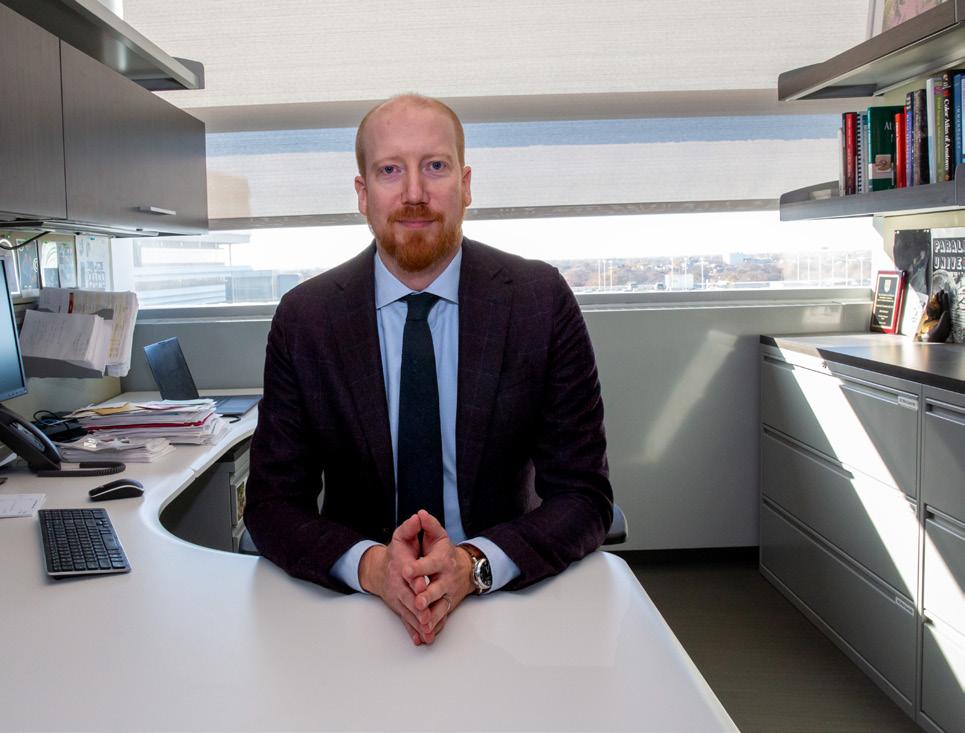

The UCCCC is the birthplace of bone marrow transplantation, following Leon Jacobson’s 1940s discovery that healthy spleen tissue could restore blood cell production in mice exposed to radiation. This groundbreaking work inspired many, including Nobel Prize winner E. Donnall Thomas, and has since benefited thousands of patients annually. Today, the UCCCC is a leader in safe and successful stem cell transplants for all ages. The UCCCC also offers innovative therapies, such as CAR T-cell, TIL and gene therapy, and maintains one of the largest portfolios of cellular therapy clinical trials in the U.S. Additionally, the David and Etta Jonas Center for Cellular Therapy was established in 2020 to advance personalized treatments for challenging cancers.
The UCCCC revolutionized head and neck cancer (HNC) treatment starting in 1988, when Everett Vokes and Ralph Weichselbaum combined radiation and chemotherapy to cure locally advanced HNC without major surgery, preserving essential functions like speech and swallowing. Daniel Haraf further enhanced this approach with precise radiation therapy that minimizes long-term side effects and preserves organ function. The team gained national recognition in 2007 for successfully treating chef Grant Achatz for stage 4 HNC while saving his tongue. Recently, they have focused on less toxic, better-tolerated treatments for HPV-associated HNC, employing strategies to “de-escalate” treatment based on cancer response. Nishant Agrawal has also advanced diagnostic approaches through genetic profiling studies.
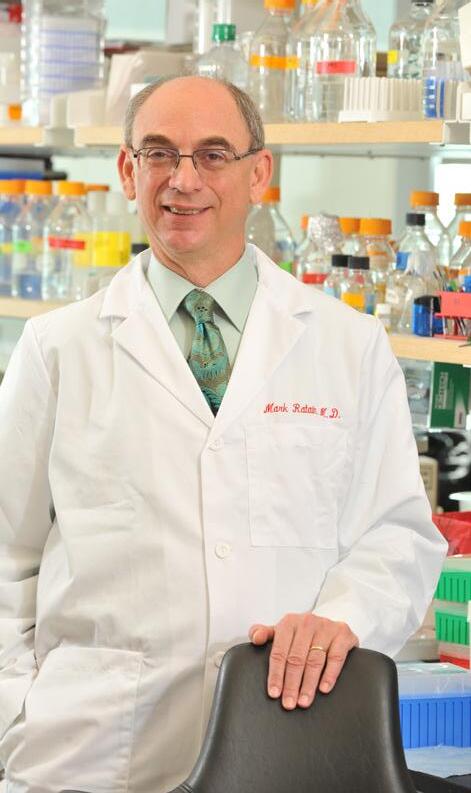
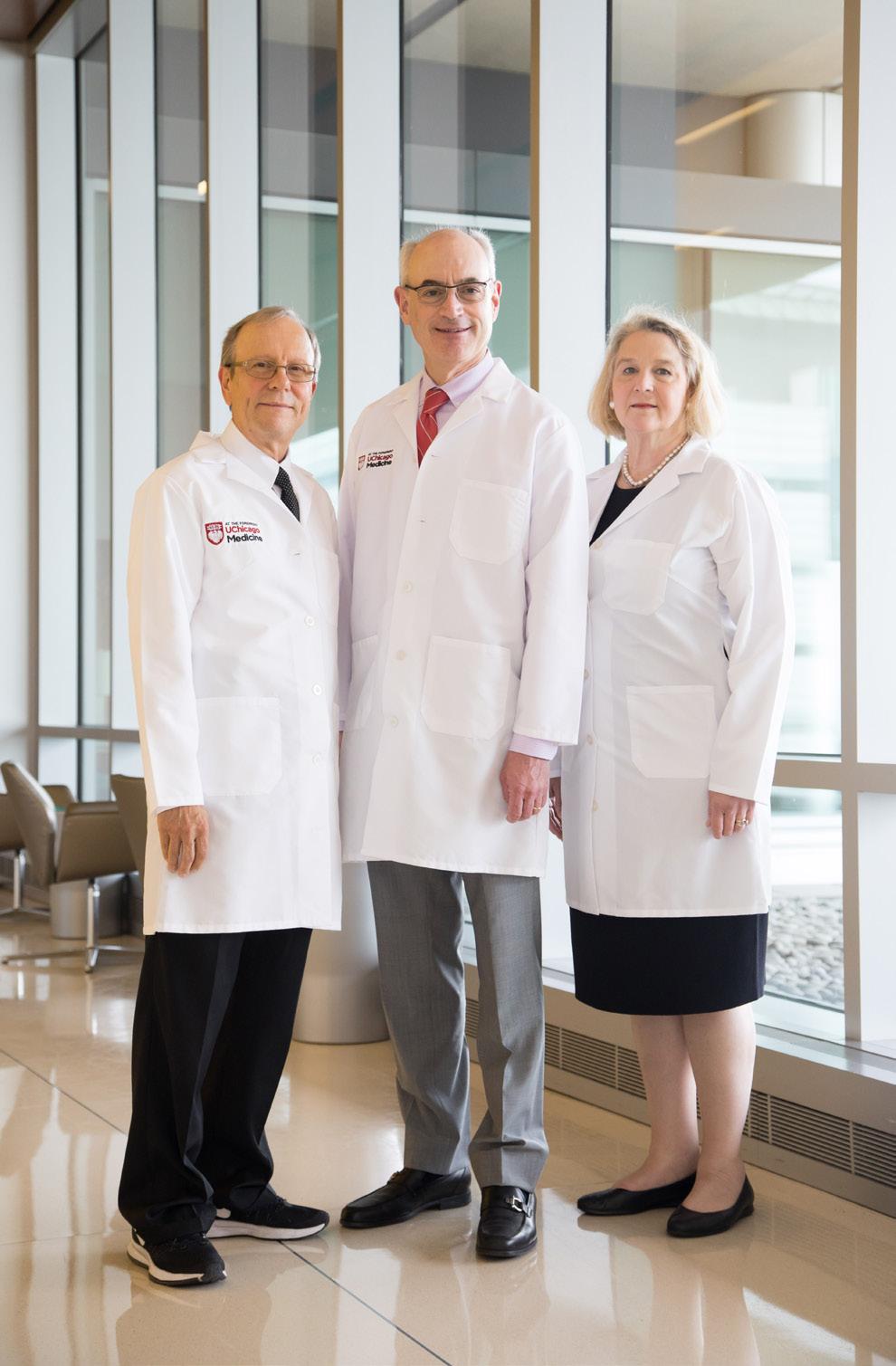
High cancer care costs create significant financial burdens, termed “financial toxicity,” a concept introduced by Mark Ratain in 2009. Ratain and colleagues are addressing this issue through research and advocacy. Jonas de Souza developed a tool to measure financial toxicity as a relevant patient-reported outcome, while Ezra Cohen discovered that grapefruit juice lets patients take a lower dose of a cancer drug. In 2018, Ratain and Russell Szmulewitz demonstrated that a lower dose of the prostate cancer drug abiraterone taken with food can reduce costs. Ratain also influenced the FDA’s Project Optimus, which mandates formal dose-response studies for new oncology drugs to identify optimal dosing.
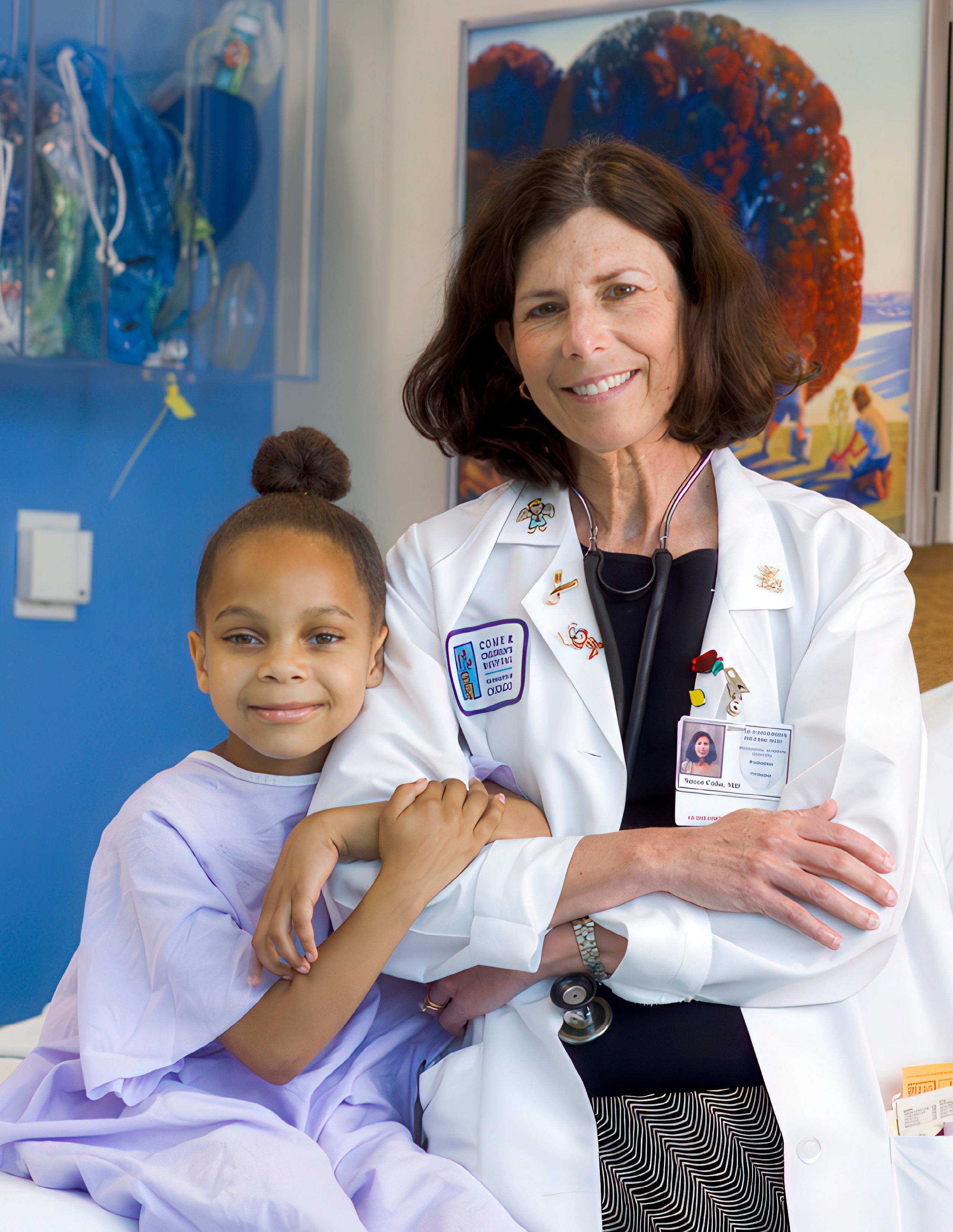
Neuroblastoma, a pediatric cancer with varied clinical behavior, requires tailored treatment based on prognostic markers and risk classification. Susan Cohn was pivotal in developing the Children’s Oncology Group neuroblastoma risk classification system, leading an international consensus approach in 2005 that analyzed data from 8,800 patients. In 2013, she, Robert Grossman and Sam Volchenboum established the International Neuroblastoma Risk Group Database, which later contributed to the Pediatric Cancer Data Commons, housing data on over 44,400 patients. Cohn’s leadership in clinical trials introduced innovative strategies like post-consolidation immunotherapy, significantly improving survival rates.
However, treatment-related toxicities remain a concern, with Tara Henderson emphasizing the need for lifelong medical surveillance for high-risk survivors. Cohn’s translational research has revealed the role of T-cell inflammation in high-risk tumors and identified immune escape pathways, paving the way for new immunotherapeutic approaches. Additionally, her collaborations have uncovered epigenomic markers that influence neuroblastoma biology, leading to the development of epigenomic liquid biopsy biomarkers currently in clinical trials.

In 1973, the 5-year survival rate for lung cancer was only 10%, but by 2023, it had risen to 26.6%. This progress is due to treatment advances, including improved disease understanding, new therapies and less invasive surgical options — many of which were pioneered by our multidisciplinary lung cancer team.
The UCCCC has a strong lymphoma research program, focusing on the most common adult blood cancer. In 1973, John Ultmann led efforts to classify different lymphoma types. Craig Thompson identified mechanisms regulating lymphocyte survival in 1993, highlighting BCL-xL as a therapeutic target. Harinder Singh mapped networks controlling hematopoietic stem cell commitment to B cells in 2004, enhancing understanding of B cell tumors. Sonali Smith opened the Hoogland Lymphoma Biobank in 2013 and demonstrated the benefits of hematopoietic cell transplantation for T-cell nonHodgkin lymphoma. In 2024, Justin Kline explored how specific T cells collaborate against classical Hodgkin lymphoma, while Michael Bishop and Peter Reidell advanced CAR T-cell therapy to harness the immune system against lymphoma.

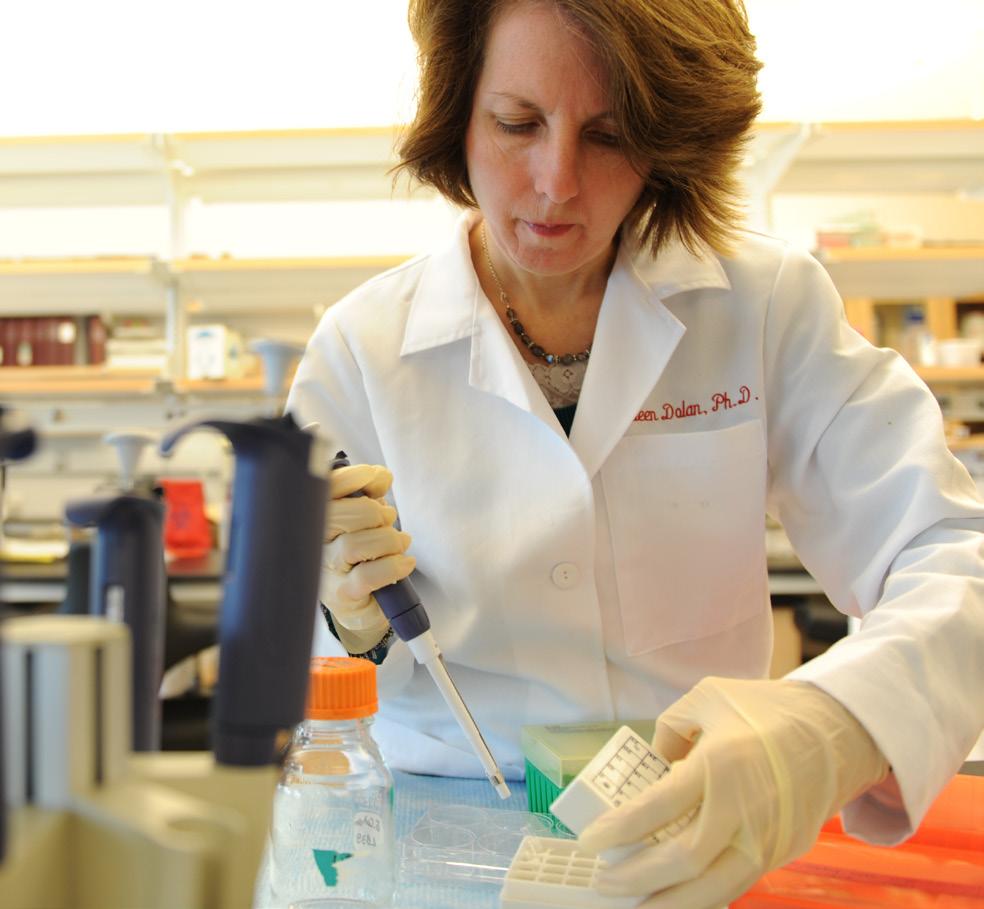
Eileen Dolan is a leader in pharmacogenomics.
Over the past two decades, UCCCC has become a national leader in pharmacogenomics — the study of how an individual’s genetic makeup influences their response to medications. Our scientists are uncovering genetic differences that help predict treatment effects. In 2004, Mark Ratain advanced the field by identifying genetic variants that indicate which cancer patients are likely to experience severe side effects from irinotecan. In 2007, Eileen Dolan developed cell-based models to explore the genetic factors contributing to chemotherapy-induced side effects, particularly severe neurotoxicities from cisplatin. In 2011, Ratain and colleagues launched the Center for Personalized Therapeutics, which includes the flagship 1200 Patients Project led by Peter O’Donnell, focusing on the implementation of pharmacogenomic testing to guide physician prescribing.

Cancer and its treatments impact both physical and emotional well-being, and supportive services can enhance treatment outcomes. The Coleman Foundation Supportive Oncology Outpatient Care Suite provides services such as physical/occupational therapy, nutrition, psycho-oncology, social work, palliative care and complementary therapies such as acupuncture. UChicago Medicine Ingalls Memorial, the only certified hospital for survivorship in Chicago’s Southland, provides a cancer rehab program and the “I Can Thrive” initiative to support survivors in moving forward.
Over the past 50 years, the UCCCC has led innovations in cancer screening to prevent or detect cancers early.
The UCCCC focuses on improving HPV vaccination and enhancing outreach for Pap smears and HPV tests, the only approved screening methods for cervical cancer.

As part of the national WISDOM study, UCCCC researchers aim to personalize and make breast cancer screening more affordable.
Designated as a Lung Cancer Screening Center of Excellence, UCCCC conducts low-dose CT scans for high-risk individuals to detect early-stage lung cancer.
With NCI Cancer Moonshot Initiative funding, UCCCC is working to improve colonoscopy screening rates, particularly among underserved populations in Cook County.
A clinic established in 2019 offers at-risk patients comprehensive genetic evaluations and tailored screening plans.
UCCCC researchers have significantly advanced the detection, diagnosis, treatment and prevention of colorectal cancer. In 1979, George Block pioneered aggressive surgical techniques that improved patient outcomes. Robert Riddell’s 1983 study introduced the term “dysplasia-associated lesion or mass” related to colorectal cancer in ulcerative colitis. Richard Schilsky found in 2003 that daily aspirin reduces precancerous polyps by a third in those with a colorectal cancer history. Mark Ratain developed a genetic test in the same year to predict serious adverse reactions to irinotecan chemotherapy in advanced colorectal cancer patients. Chun-Su Yuan identified ginseng’s chemopreventive mechanisms in 2012, and in 2023, Sean Pitroda created a method to predict favorable outcomes for patients with metastatic colorectal cancer after liver surgery.
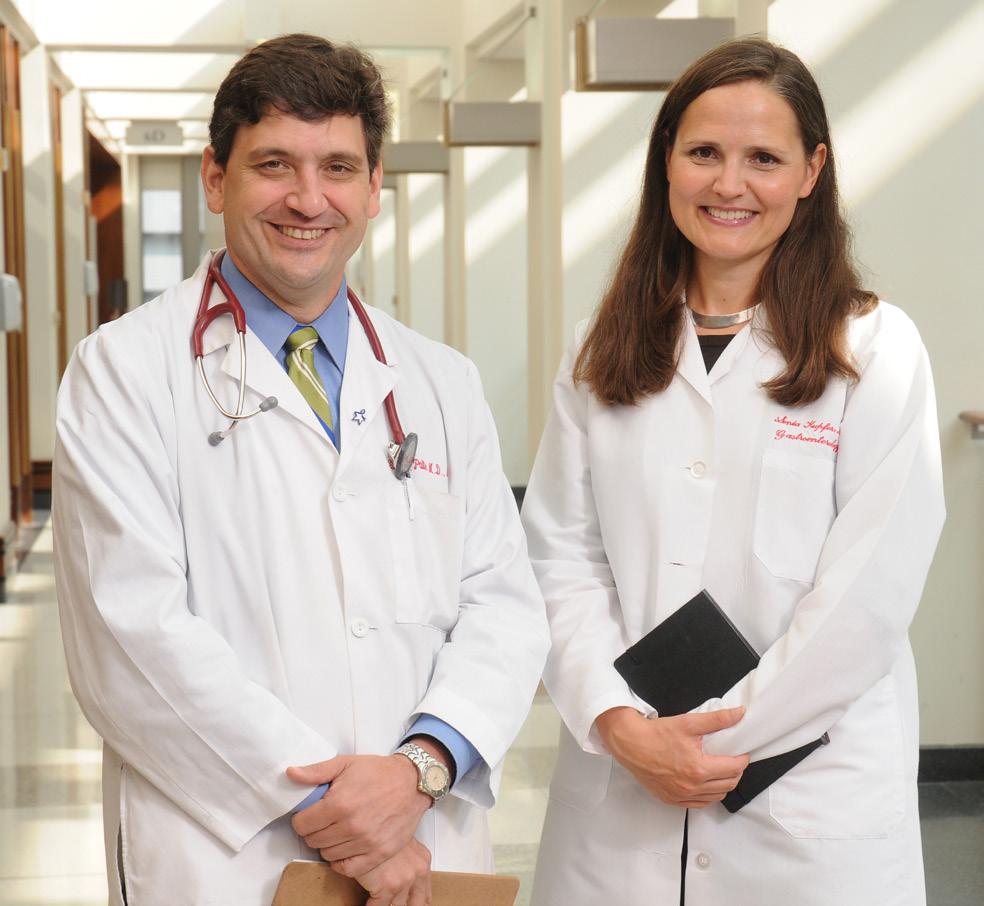

Recent research highlights the crucial role of microbiota — microorganisms in our gastrointestinal tract — in regulating immunity against cancer. UCCCC researchers are exploring this relationship, with Thomas Gajewski’s 2015 study revealing that gut microbiota composition influences the effectiveness of immunotherapy drugs in both mice and humans, identifying specific probiotic strains that can enhance treatment. Bana Jabri’s 2018 work showed that intestinal barrier disruption leads to inflammatory responses that promote leukemia through the spread of gut bacteria. In 2020, Eric Pamer’s team identified microbiota disruption patterns in cancer patients undergoing stem cell transplants, using these patterns to predict transplant outcomes. Ongoing clinical trials aim to modify the microbiota to improve patient outcomes.
Population research at UCCCC helps identify cancer risk factors across different racial and ethnic groups through long-term cohort studies. In 2013, UCCCC launched the COMPASS study to examine how lifestyle, healthcare access, environment and genetics affect the health of over 13,000 Chicagoans. In 2018, UCCCC joined the NIH Precision Medicine Initiative’s All of Us Research Program, which aims to collect data from one million participants to accelerate medical breakthroughs. Additionally, in 2021, UChicago became one of nine sites in the NCI Connect for Cancer Prevention Study, aiming to recruit 200,000 individuals from diverse backgrounds, with findings expected to influence public health and cancer prevention guidelines. Brisa Aschebrook-Kilfoy and Habibul Ahsan lead these unique cohort studies at the UChicago Institute for Population and Precision Health.


Cancer research — which involves the complex study of cellular, genetic and molecular mechanisms that contribute to tumor development — requires state-of-the-art technologies. Instead of each laboratory purchasing its own equipment, researchers can access shared technologies and specialized services through core facilities. The UCCCC supports 10 of these shared facilities through its NCI Cancer Center Support Grant to meet the needs of the cancer research community.
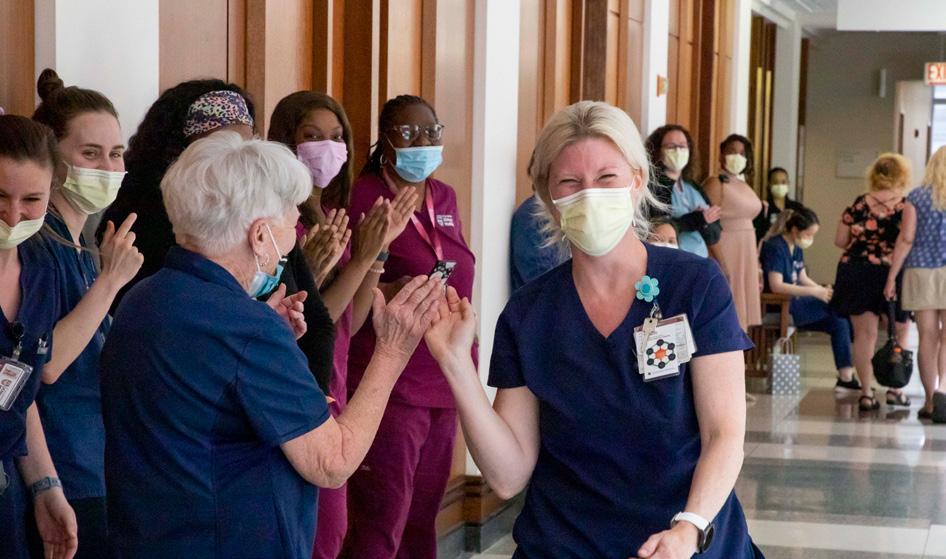
At UCCCC, having well-trained nurses as patient educators and advocates is essential. Oncology nurse navigators coordinate patient care throughout the disease process and act as clinical liaisons across departments. They play a crucial role in providing high-quality, compassionate care, ensuring that patients have someone by their side to answer questions from their first visit through the completion of treatment.

Cancer cells adapt their metabolism to meet the nutritional demands for rapid growth, significantly influencing tumor growth and metastasis. Recent research has highlighted the role of oncogenes in regulating these metabolic pathways, offering potential for novel therapeutic strategies.
In 2019, Yingming Zhao and Lev Becker showed that lactate, previously viewed as a byproduct of glucose metabolism, also regulates immune cells and promotes tumor progression. Further advancements include Jing Chen’s 2023 discovery that trans-vaccenic acid enhances CD8+ T-cell infiltration in tumors, and Xiaoyang Wu’s 2024 development of a nanoparticle system for targeted delivery of immunotherapy in lactate-rich tumor environments. These innovations are advancing our understanding of cancer and fostering new treatment approaches.

Pancreatic cancer is difficult to treat due to late detection, limiting surgery and chemotherapy options. Current screening methods are inadequate, emphasizing the need for new biomarkers and targeted therapies. In 2019, Hedy Kindler found that the PARP inhibitor olaparib effectively halted disease progression in patients with BRCA2 mutations, leading to FDA approval. In 2023, Anita Chong discovered that the modified drug CK21 shows promise against pancreatic tumors in pre-clinical studies. Alex Muir identified essential nutrients in tumor fluid, noting that blocking
arginine synthesis can inhibit tumor growth. Additionally, Simon Schwörer’s research revealed that hypoxia converts tumor fibroblasts into inflammatory cells that promote growth, suggesting that blocking this process could enhance immunotherapy. In 2024, the UCCCC hosted the Midwest’s first symposium to explore new strategies for pancreatic cancer prevention, detection and treatment.
Planners of the first-ever PancMidwest Pancreatic Cancer Research Symposium.

The use of radiation in cancer treatment gained prominence during World War II with the development of nuclear reactors and radioactive isotopes. The University of Chicago played a key role in this field, leveraging talent from the Manhattan Project. Melvin Griem helped establish radiation oncology as distinct from radiology, pioneering work with heavy particle emitters and creating a neutron therapy unit. Daniel Haraf advanced intensity-modulated radiation therapy
to minimize side effects, while Steven Chmura focused on stereotactic radiosurgery and stereotactic body radiotherapy. Ralph Weichselbaum discovered that radiation resistance is linked to cytokine activation in tumors and found that blocking VEGF can enhance radiation’s anti-tumor effects, leading to research on the interplay between radiation therapy and the immune system.

In the 1970s, Janet Rowley made groundbreaking discoveries in genetics as one of the few women in a predominantly male field. Women bring diverse perspectives to cancer research, contributing invaluable insights and innovations. However, they remain underrepresented in the sciences, particularly in research leadership. At the UCCCC, women have increasingly taken on roles traditionally held by men over the past 50 years. Rowley’s mentee, Michelle Le Beau, became the UCCCC director at a time when only one other female cancer center director existed. Many female faculty members have since emerged as leaders in their fields, mentoring and advocating for junior faculty, students and trainees.
Successfully treating multiple myeloma (MM) often requires a combination of drugs and potentially a stem cell transplant. Andrzej Jakubowiak, a leading expert in MM, heads clinical trials to expedite new treatments. In 2022, he and Benjamin Derman tested a four-drug combination therapy, including a novel immunotherapy, achieving complete responses in over half of newly diagnosed patients while minimizing side effects. In 2024, they reported that 85% of patients treated with a different four-drug regimen without a transplant were alive and progression-free after three years. Jakubowiak also led the ATLAS trial, which found that a three-drug maintenance therapy (KRd regimen) may enhance survival compared to standard treatments. For patients facing relapses, innovative therapies like CAR T-cell therapy and bispecific antibodies have transformed treatment options. UChicago Medicine became the first hospital in Chicago to offer the new FDAapproved therapies Abecma and Carvykti in 2021 and 2022, respectively.

Some of the world’s most respected institutions have recognized UCCCC members for their groundbreaking contributions to the cancer research field and to society. They have won the Nobel Prize, the Lasker Foundation Award and the Wolf Prize. They are inductees of the American Association for the Advancement of Science, the Howard Hughes Medical Institute, the MacArthur Fellowship and the National Academies of Sciences, Engineering and Medicine.


Clinical trials are essential for advancing cancer treatment and expanding patient options. The UCCCC is renowned for its contributions to drug development and early-phase trials, enrolling around 1,000 patients annually.
As a Lead Academic Participating Site for the National Clinical Trials Network, UCCCC faculty also lead national cooperative groups that significantly impact cancer research. In 2023, researchers Walter Stadler and Nita Lee received a Stand Up To Cancer® grant to enhance clinical trial participation among underserved communities in Chicago, potentially setting a national standard for engagement and representation in trials.
The UCCCC broke ground in 2023 on its $815 million project to build the state’s first and only standalone structure dedicated to cancer care and research. Expected to open to patients in spring 2027, the 575,000-square-foot, seven-story pavilion seeks to dramatically improve the experience for patients with cancer, reduce health disparities in underserved communities and speed up scientific discoveries.
